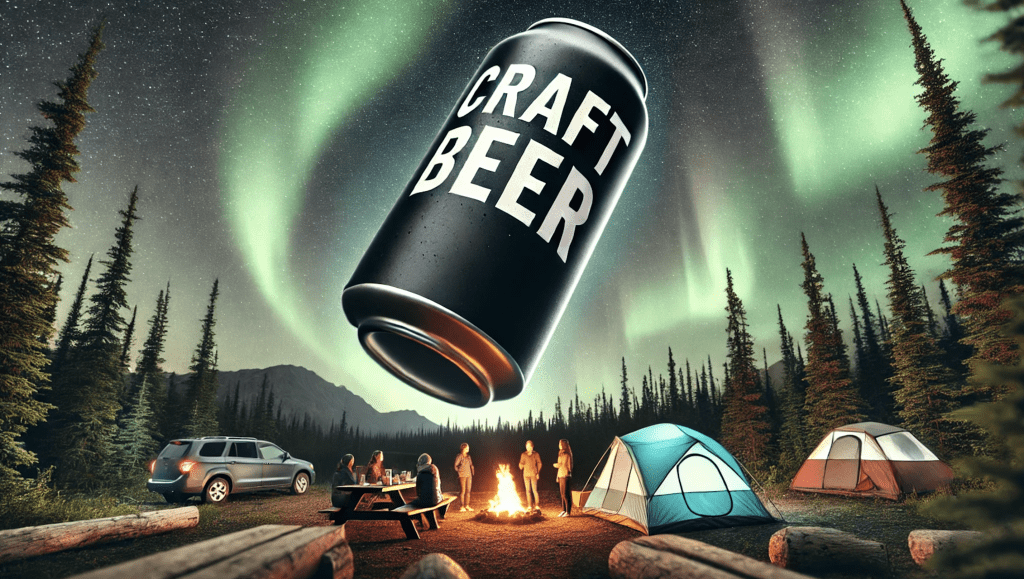British Columbia’s craft beer industry has grown from a grassroots movement into a sophisticated sector. Once driven purely by passion and creativity, today’s breweries must navigate market saturation, shifting consumer expectations, and increasing competition—not just from other craft breweries, but from non-alcoholic beverages, ready to drink (RTD) brands, and even cannabis-infused drinks.
Simply brewing great beer is no longer enough. To build a sustainable and profitable business, BC craft breweries must refine their approach to branding, marketing, and consumer engagement. Success in today’s industry depends on a brewery’s ability to articulate a clear value proposition, develop an unmistakable brand identity, and use data-driven insights to evolve.
This article will explore how BC’s craft breweries can strengthen their positioning, stand out in a crowded market, and rebuild consumer perception by leveraging smart business strategies, innovative branding, and storytelling.
Define Your Goals and Work Backwards: The Foundation of a Successful Craft Brewery
Before crafting a marketing plan, designing labels, or launching new products, breweries need to clearly define their long-term business objectives. A well-structured business strategy should shape every decision—from branding and consumer engagement to distribution and expansion.
Key questions to ask before making strategic moves:
- What do we want to be known for? Is it hyper-locality, experimental brewing, sustainability, or culinary pairings?
- What problem are we solving for the consumer? A brewery must define the specific value it provides to its audience beyond just good beer.
- What emotions should customers associate with our brand? Successful brands create emotional connections—whether it’s nostalgia, humor, adventure, or craftsmanship.
- Who is our ideal customer? Identifying and understanding target demographics (from first-time beer drinkers to seasoned craft enthusiasts) will shape branding and product strategy.
- What does success look like? Clear KPIs (growth in sales, brand recognition, engagement metrics) should guide long-term planning.
Working backwards from these answers allows breweries to strip away unnecessary complexity, refine their brand identity, and make strategic decisions that align with their mission.
Using Data and Analytics to Strengthen Business Fundamentals
While craft beer is a creative industry, breweries must think like data-driven businesses. Many independent brewers underutilize analytics and market insights, resulting in missed opportunities for growth.
How to Leverage Data for Smarter Decision-Making
- Track customer buying habits: Understanding when, where, and how people purchase craft beer helps optimize distribution and pricing strategies.
- Use feedback loops to refine offerings: Online surveys, social media engagement, and direct consumer insights can guide future product development.
- Monitor industry trends: Non-alcoholic beer, hybrid beer styles, and premium packaging are growing segments—staying ahead of these trends can boost competitive advantage.
- Evaluate product performance: Not every beer needs to be a year-round staple. Seasonal and limited releases can generate excitement while reducing stale inventory.
By embedding data-driven decision-making into business operations, breweries can refine their product offerings, enhance consumer engagement, and maximize profitability.
Crafting a Brand Identity That Stands Alone
Too many breweries rely on generic craft beer aesthetics—handwritten fonts, overused hop illustrations, and uninspired names. To stand out, breweries must develop a distinct brand language, storytelling approach, and design philosophy.
What Defines a Strong Craft Beer Brand?
- A Guiding Star: Every brewery should have a central ethos that informs branding, storytelling, and marketing. Whether it’s “adventurous brewing” or “BC’s most sustainable beer,” a clear mission strengthens brand consistency.
- Ownable Cultural Touchpoints: Branding should be rooted in something unique to the brewery—be it local folklore, personal stories, or historical references.
- Linguistic Originality: Breweries should create their own neologism—unique beer names, proprietary taglines, and clever descriptions can set a brand apart.
- Quirky and Distinct Visuals: Whether embracing bold colors, unexpected mascots, or fine-art-inspired packaging, breweries should move beyond formulaic label design.
A compelling brand identity isn’t just about looking different—it’s about building an ecosystem of meaning that consumers can connect with.
Escaping the Copycat Trap: Why Imitation Stunts Growth
A significant issue in the BC craft beer industry is the tendency for breweries to mimic each other. This results in market oversaturation, where multiple breweries have nearly identical branding, beer styles, and packaging.
How to Break Away from Imitation and Find Your Own Lane
- Develop branding in isolation: Instead of monitoring competitors, breweries should develop their brand identity in a creative vacuum before refining it based on consumer feedback.
- Experiment with unconventional designs: Textured labels, hand-drawn mascots, or collage-style branding can create a unique visual footprint.
- Emphasize storytelling over trends: While aesthetic trends come and go, a well-crafted brand story remains timeless.
- Test and iterate: Run small-batch releases, exclusive collaborations, or limited-edition can designs to gauge consumer interest before fully committing.
Breweries that prioritize originality over industry conformity will build stronger, more loyal customer bases.
Repositioning Craft Beer as a Culinary Experience
Beer isn’t just a beverage—it’s an integral part of food culture. However, many BC breweries fail to capitalize on this positioning.
How to Elevate Beer as a Culinary Product
- Strengthen beer and food pairings: Position beer alongside cuisine through curated pairing events, restaurant collaborations, and on-label recommendations.
- Emphasize local ingredients: Highlighting regionally sourced hops, grains, and adjuncts adds value and authenticity.
- Create immersive tasting experiences: Brewery visits should go beyond simple tastings—consider multi-sensory experiences that combine storytelling, education, and gastronomy.
By integrating craft beer into the culinary world, breweries can access a wider audience and increase perceived product value.
Humanizing Your Brewery: The Role of Storytelling and Local Culture
Modern consumers crave authenticity. The best craft breweries aren’t just selling beer—they’re selling a story.
Strategies to Create Deeper Connections with Consumers
- Put faces to the brand: Showcase brewers, founders, and team members to create emotional connections.
- Celebrate local history and culture: Integrate elements of BC’s diverse cultural landscape into branding, from Indigenous storytelling to regional heritage.
- Craft a brand narrative that evolves: Rather than a static “about us” page, brands should develop ongoing stories—seasonal releases can reflect changing themes and inspirations.
People don’t just buy craft beer—they buy into the story behind it.
Expanding Audience Reach: Multi-Language Marketing and Consumer Inclusivity
Craft beer often targets a narrow demographic—primarily young, English-speaking men. To grow, breweries must embrace inclusive marketing strategies.
- Multi-language packaging and advertising: BC is one of Canada’s most multicultural provinces—branding should reflect this diversity.
- Welcoming first-time craft beer drinkers: Not everyone is familiar with double IPAs and barrel-aged stouts. Breweries should develop approachable, educational messaging for new consumers.
- Understanding user intent: Some consumers want bold experimental flavors, while others seek easy-drinking classics—branding and marketing should reflect these different journeys.
A diverse audience requires a diversified approach to branding and outreach.
The Organizations Powering BC’s Craft Beer Industry
British Columbia has a strong network of organizations that support and advocate for the craft beer industry. Here are the key entities:
- BC Ale Trail: A tourism initiative offering self-guided tours that pair craft brewery experiences with the natural beauty of British Columbia, encouraging both locals and visitors to explore the province’s diverse beer culture.
- BC Beer Awards and Festival: An annual event that celebrates excellence in BC brewing, recognizing the best craft beers and breweries in the province.
- BC Craft Brewers Conference: An annual gathering that brings together industry professionals for educational seminars, networking opportunities, and showcases of industry innovations.
- BC Craft Brewers Guild: Represents and advocates for BC’s independent craft breweries, promoting the creation and discovery of truly great BC craft beer.
- BC Craft Beer Month: A month-long celebration in October featuring special events, new releases, tastings, tap takeovers, beer dinners, and more, highlighting the province’s craft beer culture.
- Brewery & the Beast: An annual event that pairs craft beer with culinary offerings, featuring a curated lineup of award-winning craft beers, specialty cocktails, traditional cider, spirits, and hard seltzers.
- Brewloops Beer Festival: A non-profit organization in Kamloops that promotes local culture through events celebrating BC craft beer, music, and entertainment, fostering community engagement.
- Canadian Craft Brewers Association: A national organization that advocates for and supports craft brewers across Canada, including those in British Columbia.
- Great Canadian Beer Festival: Held annually in Victoria since 1993, this festival focuses on cask ales from the Pacific Northwest and attracts numerous craft breweries and thousands of visitors each year.
- The Growler: A publication dedicated to BC’s craft beer scene, offering news, brewery listings, and articles about the province’s beer culture.
- Tourism BC: Promotes British Columbia’s craft beer scene as a travel experience, integrating brewery visits into the province’s tourism landscape.
- Tourism Industry Association of BC: Collaborates with the BC Craft Brewers Guild to promote the craft beer sector as a significant component of the province’s tourism offerings.
- Vancouver Craft Beer Week: Established in 2010, VCBW is Canada’s first “beer week” festival, featuring numerous events across Vancouver that culminate in a grand tasting festival, celebrating craft beer culture.
- Vancouver’s North Shore Craft Beer Week: An annual celebration of craft brewing in the North Shore region, hosting events, tastings, and more to highlight local breweries.
The Future of BC Craft Beer
The BC craft beer industry is at a turning point. To thrive, breweries must embrace business fundamentals, develop unique branding, and prioritize consumer connection. Operating a brand in the BC craft beer industry does not need to be tedious or turbulent if you understand the essentials—focusing on business basics, using customers as the core of planning, and leveraging data and analytics to refine and optimize strategies. Success comes from mastering the fundamentals first, then working backward to create efficient systems that drive growth and sustainability.
By staying true to your vision, brand, and values while continuously evolving based on real consumer insights, breweries can carve out a distinct identity that stands the test of time. The BC craft beer industry is a growing, thriving, and culturally dynamic space filled with limitless potential for those willing to innovate and differentiate.
Bl3nd Design welcomes everyone in the BC craft beer industry to connect with us for expert business consulting and planning. Whether you’re launching a new brewery, rebranding an existing one, or simply looking for strategic guidance to get your business back on track, we’re here to help. Together, we can ensure that BC’s craft beer industry not only sustains but flourishes for years to come.
History of Craft Beer in British Columbia Canada
British Columbia (BC) has become one of North America's most celebrated craft beer destinations, with a vibrant, diverse, and innovative brewing culture. From Indigenous fermentation traditions to European settlers, Gold Rush-era breweries, Prohibition, corporate domination, and the explosion of the modern craft beer movement, BC’s brewing history is a fascinating evolution of flavors, techniques, and cultural influence. This comprehensive account explores every key milestone, significant figure, and defining moment in the province’s brewing history, tracing its journey from early beer-making to today’s craft beer revolution.
Early Brewing and Indigenous Fermentation Traditions (Pre-1800s)
Before European settlement, Indigenous communities across the Pacific Northwest had extensive knowledge of fermentation. While these weren’t beers in the modern sense, fermented beverages made from berries, roots, and botanicals existed, using natural yeasts present in the environment. Alcoholic fermentation among Indigenous cultures was largely overlooked by early settlers, but it demonstrates that BC had a long tradition of fermentation before formal brewing practices were introduced by European colonists.
The Arrival of European Brewing Traditions (Early 1800s–1850s)
The first known instances of beer brewing in British Columbia can be traced to the Hudson’s Bay Company (HBC), which established key fur trading posts throughout the Pacific Northwest. Brewing was an essential practice among British and European traders, as beer was safer to drink than untreated water and helped sustain workers in remote outposts.
- Fort Vancouver Brewery (1825) – The earliest large-scale brewing operation serving the Pacific Northwest, operated by the HBC in present-day Washington State but supplying much of BC.
- Fort Langley (1827) – Beer brewing was likely practiced here as it became an important trading post along the Fraser River.
- Fort Victoria (1843) – Brewing was a necessity for British settlers, and small-scale production would have occurred here before formal breweries emerged.
The Gold Rush and the Birth of Commercial Brewing (1858–1890s)
The Fraser Canyon Gold Rush (1858) and the Cariboo Gold Rush (1860s) brought an influx of miners, prospectors, and settlers to British Columbia. The sudden rise in population created a booming demand for beer, leading to the establishment of BC’s first commercial breweries.
Key Breweries & Figures of the Gold Rush Era
- Victoria Brewery (1858, Victoria) – Founded by William Steinberger, this was one of BC’s first known commercial breweries.
- Phoenix Brewery (1859, Victoria) – Founded by Charles Gowlland, another pioneer of early BC brewing.
- Columbia Brewery (1860s, New Westminster) – One of several breweries serving the growing population along the Fraser River.
- Barkerville Brewery (1860s, Cariboo Region) – Established in the heart of the Cariboo Gold Rush to provide beer for miners.
Impact of Immigration on Beer Styles
- British brewers brought mild ales, porters, and bitters.
- German immigrants introduced lagers and pilsners, which would become dominant in the coming decades.
By the late 19th century, brewing was a profitable industry, and BC had a growing network of local breweries serving towns, mining camps, and logging communities.
The Rise of Large Breweries and the Prohibition Era (1890s–1921)
As settlements grew into cities, breweries expanded and consolidated. Many early pioneers were absorbed into larger brewing companies, forming the foundation for BC’s major beer producers.
Key Breweries of the Late 19th & Early 20th Century
- Doering & Marstrand Brewery (1890, Vancouver) – One of the city’s first large breweries.
- Silver Spring Brewery (1900, Victoria) – A significant regional producer.
- Capilano Brewery (1890s, North Vancouver) – Another early major operation.
With beer’s popularity growing, the Temperance Movement gained momentum, leading to Prohibition in BC (1917–1921). During this period:
- Many breweries shut down.
- Some survived by producing near-beer (low-alcohol beer) or soft drinks.
- Illegal brewing and smuggling (bootlegging) became rampant.
Corporate Domination and the Decline of Independent Brewing (1921–1970s)
After Prohibition ended in 1921, BC’s brewing industry was heavily regulated. Government-controlled liquor distribution created challenges for small breweries, while major brewing companies expanded.
The Era of Mergers & Mass Production
Throughout the mid-20th century, small breweries were acquired by national brands, leading to a homogenization of beer styles. The major players included:
- Labatt Brewing Company – Originally from Ontario, expanded in BC.
- Molson Brewery – Set up operations in BC in the 1950s.
- Carling O’Keefe – Another dominant brand, eventually merging with Molson.
- Lucky Lager (Victoria, 1934) – One of the few BC brands to survive independently.
By the 1960s and 1970s, pale lager was virtually the only beer style available, with little diversity. Independent breweries had nearly disappeared, setting the stage for a brewing revolution.
The Birth of BC’s Craft Beer Movement (1980s–1990s)
By the late 1970s, beer consumers grew dissatisfied with mass-market lagers, craving flavorful, traditional, and unique styles. Inspired by the American craft beer movement, BC saw the rise of microbreweries and brewpubs.
Key Pioneers of BC Craft Beer
- Horseshoe Bay Brewery (1982, West Vancouver) – Founded by Frank Appleton and John Mitchell, BC’s first modern craft brewery.
- Spinnakers Brewpub (1984, Victoria) – Canada’s first licensed brewpub, a game-changer for craft beer culture.
- Granville Island Brewing (1984, Vancouver) – One of BC’s first microbreweries, making craft beer more accessible.
- Phillips Brewing (2001, Victoria) – Founded by Matt Phillips, became a leading name in BC’s craft beer scene.
Craft beer culture began taking root, but the market was still dominated by large breweries.
The Craft Beer Explosion (2000s–2020s)
The 2000s and 2010s marked an unprecedented explosion in BC’s craft brewing industry. Changes in liquor laws, rising consumer demand, and creative experimentation led to hundreds of new breweries.
Key Trends & Developments
- IPA Boom – BC breweries became famous for their bold, hoppy IPAs.
- Barrel Aging & Sours – Breweries like Strange Fellows and Four Winds pioneered new styles.
- Brewery Districts – Vancouver’s Yeast Van, Port Moody’s Brewer’s Row, and Victoria’s Rock Bay became craft beer hubs.
- Farm-to-Glass Brewing – Breweries like Persephone and Field House focused on local ingredients.
By 2023, BC had over 200 craft breweries, cementing its reputation as a global leader in craft brewing.
The Future of BC Craft Beer (2025 & Beyond)
BC’s craft beer industry continues to innovate with trends such as:
- Sustainability & Eco-Friendly Brewing
- Low-Alcohol & Non-Alcoholic Craft Beer
- Experimental Brewing with New Hops & Yeasts
With a strong foundation and continued creativity, British Columbia’s craft beer scene remains at the forefront of the global beer revolution. From small-town breweries to internationally acclaimed producers, BC’s brewing legacy is one of resilience, passion, and innovation.
A Complete Guide to Craft Beer Styles & Flavors
Craft beer is celebrated for its vast diversity of styles and flavors, ranging from crisp and refreshing lagers to bold, hop-forward IPAs, rich and malty stouts, and complex, barrel-aged creations. Whether you're a casual drinker or a craft beer connoisseur, understanding the different types of beer can enhance your tasting experience and help you explore new favorites. This section provides a comprehensive breakdown of all known beer styles, their defining characteristics, and the flavor profiles that make them unique. From the world's most traditional brews to experimental and hybrid styles, this list covers everything a craft beer enthusiast should know.
LAGERS (Clean, Crisp, and Refreshing)
Lagers are known for their smooth, clean flavors and crisp finish, achieved through cold fermentation and extended aging. These beers tend to have a light body and a focus on malt sweetness with subtle hop bitterness.
- Pale Lager – Light, crisp, and highly drinkable with subtle malt sweetness and mild bitterness (e.g., Pilsner Urquell, Stella Artois).
- Pilsner – A more bitter, hop-forward version of a pale lager, originating in the Czech Republic and Germany, often featuring spicy, floral, or herbal hop notes.
- Helles Lager – A maltier, slightly sweeter German-style lager with a soft, rounded body, often with notes of bread and biscuit.
- Dortmunder Export – A balanced lager with a malt-forward backbone and a touch of hop bitterness, stronger than a Pilsner but drier than a Helles.
- Amber/Red Lager – A maltier, slightly toasty lager with caramel and toffee notes, sometimes with a hint of nutty complexity.
- Dark Lager (Schwarzbier) – A dark, roasty lager with mild chocolate and coffee flavors but a light, crisp body.
- Vienna Lager – A smooth, medium-bodied lager with a reddish hue, toasted malt, and a dry finish.
- Bock – A stronger, malt-driven German lager with caramel, toasted bread, and mild sweetness, usually darker in color.
- Doppelbock – A richer, higher-alcohol version of a bock, often featuring deep toffee, dark fruit, and a full-bodied malt profile.
- Eisbock – A high-alcohol, concentrated version of a doppelbock, created through freeze-distillation, which enhances its rich malt and dark fruit character.
- Maibock (Helles Bock) – A spring seasonal beer that is lighter in color than a traditional bock, with a strong malt backbone and a crisp, slightly hoppy finish.
ALES (Diverse, Flavorful, and Often Fruity)
Ales are fermented at warmer temperatures, creating fruitier, more complex flavors than lagers. They range from light and refreshing to dark and full-bodied.
- Pale Ale – Balanced, easy-drinking with mild malt sweetness and a floral, citrus, or pine hop profile.
- English Bitter (ESB - Extra Special Bitter) – A low-carbonation, malt-forward ale with a mild, earthy hop presence, often with biscuit and toffee notes.
- Golden Ale – A light, refreshing ale with subtle fruitiness, a crisp body, and mild malt sweetness.
- Blonde Ale – Similar to a golden ale but often slightly maltier, with smooth, rounded flavors and a balanced finish.
- Red Ale (Irish Red Ale) – A malt-forward ale with caramel, toffee, and sometimes roasted notes, often smooth and slightly sweet.
- Brown Ale – A darker, nuttier ale with chocolate, caramel, and mild roastiness, ranging from English-style sweet brown ales to drier, more hop-forward American versions.
- Scotch Ale (Wee Heavy) – A rich, malty ale with caramel, toffee, and dark fruit notes, often with a warming alcohol presence.
IPAS (India Pale Ales) (Hop-Forward, Bold, and Bitter)
IPAs are known for their intense hop aromas and flavors, ranging from citrusy and piney to juicy and tropical.
- West Coast IPA – A bitter, resinous, piney IPA with citrus-forward hops and a dry finish.
- New England IPA (Hazy IPA) – A juicy, hazy IPA with low bitterness, a smooth, pillowy mouthfeel, and tropical fruit flavors.
- Double IPA (DIPA/Imperial IPA) – A higher-alcohol IPA with intense hop flavors and a malt backbone, often with citrus, pine, and resinous hop notes.
- Session IPA – A lower-alcohol IPA that maintains a strong hop character while being more drinkable and refreshing.
- Black IPA (Cascadian Dark Ale) – A dark, roasted IPA with coffee, chocolate, and piney hop bitterness.
- Milkshake IPA – A lactose-infused, smooth IPA with a creamy mouthfeel and fruit flavors.
- Brut IPA – A bone-dry, champagne-like IPA with effervescent carbonation and crisp hop character.
STOUTS & PORTERS (Dark, Roasty, and Rich)
Stouts and porters are dark ales with rich flavors of chocolate, coffee, and caramel, often full-bodied and smooth.
- Dry Stout (Irish Stout) – A roasty, dry stout with a smooth body and moderate bitterness (e.g., Guinness).
- Oatmeal Stout – A fuller-bodied stout with a creamy mouthfeel from oats, often with chocolate and coffee flavors.
- Milk Stout (Sweet Stout) – A stout with lactose sugar, making it smooth and slightly sweet.
- Imperial Stout – A high-alcohol, full-bodied stout with deep roasted malt complexity, often aged in barrels.
- Pastry Stout – A dessert-style stout brewed with ingredients like vanilla, cocoa, caramel, and nuts.
- Baltic Porter – A high-alcohol, smooth, lagered porter with dark fruit notes and rich malt depth.
- Smoked Porter – A porter with smoked malt, giving it a campfire, bacon-like, or earthy character.
SOUR & WILD ALES (Tart, Funky, and Experimental)
Sour beers use wild yeasts and bacteria to create tart, funky, and fruity flavors.
- Berliner Weisse – A light, tart wheat beer often served with fruit syrups.
- Gose – A salty, tart wheat beer with coriander and citrus.
- Lambic – A spontaneously fermented Belgian ale with funky, wild yeast characteristics.
- Gueuze – A blend of aged and young lambics, creating a dry, effervescent sour ale.
- Flanders Red/Brown – A rich, wine-like Belgian sour with dark fruit notes.
- American Wild Ale – A broad category for experimental sour ales using wild yeast strains.
- Kettle Sour – A modern sour beer brewed quickly using lactobacillus bacteria.
HYBRID & SPECIALTY BEERS
- Barrel-Aged Beers – Any beer aged in whiskey, wine, or rum barrels for added depth.
- Rye Beer – Brewed with rye malt, adding a spicy, earthy character.
- Pumpkin Ale – A spiced seasonal beer with cinnamon, nutmeg, and clove.
- Fruit Beer – A beer brewed with real fruit, ranging from light wheat ales to rich stouts.
- Coffee Beer – A beer infused with coffee beans for roasty complexity.
- Honey Beer – Brewed with honey for subtle floral sweetness.
- Gruit – An ancient beer style brewed without hops, using herbs and spices instead.
Final Thoughts
Craft beer is an ever-evolving world, with brewers constantly pushing boundaries to create new styles, hybrid flavors, and innovative brewing techniques. Whether you enjoy light, crisp lagers, bold hop-forward IPAs, rich and roasty stouts, or complex barrel-aged and sour beers, this guide offers a foundation for understanding the incredible range of flavors and styles in craft beer. No matter your preference, there’s always something new to explore in the BC craft beer scene!
Questions BC Craft Beer Operators Should Ask
This comprehensive question bank is designed to help BC craft brewery owners and operators gather actionable customer feedback across all aspects of their business. These questions can be used in surveys, casual conversations, social media polls, focus groups, taproom interactions, and online forms.
Beer Quality & Selection
Understanding consumer preferences and improving beer offerings.
- What’s your favorite beer style, and why?
- What’s your least favorite beer style, and why?
- How often do you try new beer styles versus sticking with your favorites?
- Are there any beer styles you wish we offered but currently don’t?
- Do you prefer traditional or experimental craft beer flavors?
- How do you feel about sour beers / barrel-aged beers / hazy IPAs / dark lagers?
- What’s the best beer you’ve had from us, and what made it stand out?
- What’s one thing we could do to improve the flavor of our beers?
- Do you prefer small-batch seasonal releases or a consistent core lineup?
- What other BC breweries do you love, and why?
- If you could create your own dream beer, what would it be?
Taproom & On-Site Experience
Improving the customer experience inside the brewery.
- What’s your go-to brewery atmosphere: cozy & intimate or large & social?
- How would you rate the vibe and ambiance of our taproom?
- Are there any changes we could make to improve seating, lighting, music, or decor?
- What’s one small touch that would make our taproom experience even better?
- How can we make our staff interactions more enjoyable and memorable?
- Do you feel like our pricing is fair for the quality and experience we offer?
- Are our beer flights and tasting sizes appropriate for sampling?
- Do you enjoy beer education opportunities (e.g., tasting notes, brewing process explanations)?
- Would you attend behind-the-scenes brewery tours or beer-making classes?
- How often do you visit multiple breweries in one trip, and how does that affect your experience with us?
Packaging & Take-Home Options
Understanding consumer behavior for off-site consumption.
- Do you prefer to drink beer on-site or take it home?
- How often do you purchase growlers, crowlers, or cans from breweries?
- What’s your favorite beer packaging format (cans, bottles, growlers, crowlers, kegs)?
- How important is can design and branding when choosing a new beer?
- Do you feel our beer packaging is eye-catching and informative?
- Would you be interested in a beer subscription box or mix pack?
- Would you like more options for single-can purchases vs. 4-packs or cases?
- Where do you typically buy craft beer (brewery, liquor store, restaurant, online)?
- Would you buy our beer if it was available in local grocery stores?
Events & Community Engagement
Gathering input on local events and engagement opportunities.
- What types of brewery events do you enjoy the most? (Live music, trivia, comedy, beer releases, food pairings, etc.)
- Would you attend members-only or VIP beer nights?
- Are you interested in beer & food pairing dinners?
- Would you participate in a brewery-run club or fitness event?
- What local charities or community causes would you like us to support?
- Would you like to see more collaborations with other breweries?
- How important is it that a brewery is involved in the local community?
- How likely are you to recommend our brewery to out-of-town visitors?
Retail & Distribution
Understanding how and where customers buy beer outside the taproom.
- Where do you typically buy your craft beer outside of breweries?
- How often do you buy our beer from liquor stores versus at our brewery?
- What’s your biggest frustration with buying craft beer at liquor stores?
- Which BC liquor stores should carry more of our beer?
- Have you seen our beer in restaurants, bars, or taprooms? If so, where?
- Do you prefer to buy craft beer online for home delivery?
- What would make you more likely to subscribe to an online beer club?
Food & Non-Beer Offerings
Enhancing food and beverage pairings.
- How important is having food options at a brewery?
- Would you prefer a food truck, in-house kitchen, or BYOF (bring your own food)?
- What type of food do you think pairs best with our beer?
- Would you be interested in beer & food pairing menus or events?
- Should we offer more non-alcoholic options (mocktails, craft sodas, kombucha)?
- Would you be interested in a house-brewed non-alcoholic beer?
Marketing, Branding & Social Media
Understanding how customers engage with brewery content.
- How did you first hear about our brewery?
- Do you follow us on social media (Instagram, Facebook, TikTok, etc.)?
- What kind of content do you enjoy the most? (Behind-the-scenes, beer releases, memes, staff features, etc.)
- Do you find our website easy to navigate for beer info and events?
- Would you sign up for a brewery email newsletter with updates and deals?
- Would you participate in exclusive online pre-orders for new beer releases?
- How likely are you to buy brewery merchandise (shirts, hats, glassware, etc.)?
Sustainability & Ethical Practices
Understanding consumer preferences for sustainability in craft brewing.
- How important is it for a brewery to be environmentally conscious?
- Do you prefer breweries that use local BC ingredients?
- Would you pay more for beer brewed with 100% sustainable practices?
- How important is it for a brewery to minimize waste and water usage?
- Should we expand our efforts to use compostable or reusable packaging?
- Would you support a deposit-return program for growlers and cans?
Customer Loyalty & Memberships
Exploring ways to keep customers engaged long-term.
- Would you be interested in a brewery loyalty program (discounts, points, exclusive releases)?
- Would you pay for a yearly membership that includes perks like early beer access or discounts?
- What exclusive perks would make a membership program worth it to you?
- Do you regularly visit the same breweries, or do you prefer to try new ones each time?
- What’s the biggest factor in choosing a brewery to visit more than once?
Industry & Competitive Insights
Understanding how customers compare different breweries.
- What’s the biggest factor when choosing a craft brewery? (Beer quality, atmosphere, staff, price, location?)
- What brewery outside of BC do you wish we were more like, and why?
- What’s the most memorable craft beer experience you’ve ever had?
- If you could change one thing about the craft beer industry in BC, what would it be?
- How do you feel about beer pricing in BC compared to other provinces or countries?
Final Thoughts
This master list of questions allows BC craft brewery operators to engage with customers in a meaningful way and align feedback with business analytics. By continuously collecting data through these questions, breweries can refine their offerings, improve customer experience, and innovate their business models to thrive in BC’s competitive craft beer market.





















